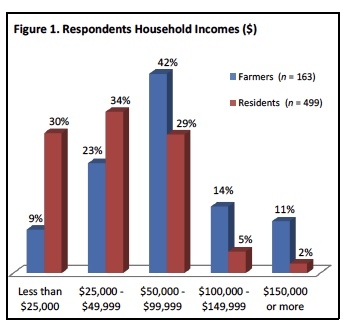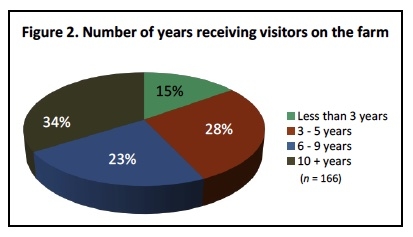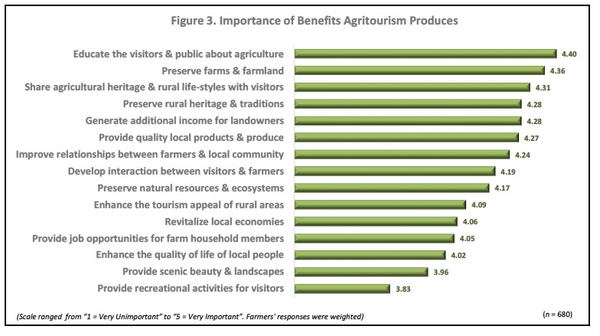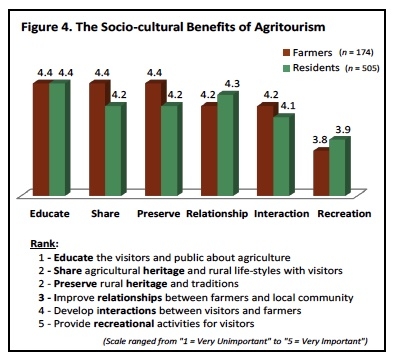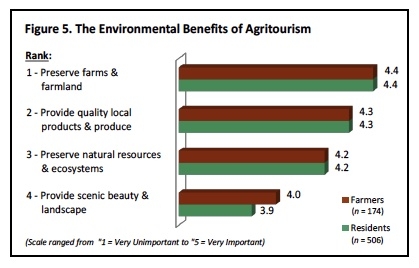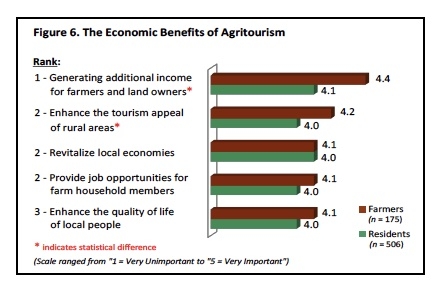Introduction
Agritourism, defined as activities offered on working farms and other agricultural settings for entertainment or educational purposes (Rich et al., 2012), has been increasing over the last ten years (Cordell, 2008). Despite its growth, there is uncertainty about the benefits that agritourism brings to society, especially to rural communities. Understanding the benefits of agritourism is essential to further develop this recreational activity and to strengthen marketing efforts to attract more visitors to farms. To document perceptions of the socio-cultural, environmental, and economic benefits of agritourism, an online survey was conducted in 2010 among North Carolina agritourism providers (“farmers”) and a non-random panel of current and potential visitors (“residents”).1
1 The study sample was composed of 604 agritourism farmers (listed in the North Carolina Agritourism Networking Association) and a non-random panel of 675 North Carolina residents (purchased from a web marketing company); they were emailed and asked to access the survey by clicking on a link. The survey received 676 responses: 173 farmers and 503 residents. Farmers’ responses were weighted to compensate for disproportionate sample sizes when applicable. T-tests were used to compare perceived benefits between farmers and residents (p < 0.05), and Wilcoxon Signed Ranks Tests were used to compare the order rank of perceived sociocultural, environmental, and economic benefits (Bonferroni adjusted p < 0.003, p < 0.008, and p < 0.003, respectively). ↲
Respondent Profile
Responding farmers (63%) and residents (57%) were predominantly female. In general, farmers were older (53 years old) than residents (46 years old). Most farmers (59%) reported an annual household income between $35,000 and $99,999 before taxes; a relatively large proportion (25%) earned more than $100,000 (Figure 1). About half (46%) of the residents reported an annual household income smaller than $34,999. This is consistent with the low proportion of full-time employees among the respondents (28%), an occurrence most likely due to the economic crisis underway during the time of the study.2
Surveyed farmers were actively farming, with 85% growing agricultural products for commercial sale. These farmers represented farms of different sizes with an average farm size of 138 acres and gross sales between $50,000 and $99,999.
2The overrepresentation of low-income and part-time employed residents in this study cautions for generalizing results to all North Carolina residents. However, results reflect the perceptions of residents with enough interest in agritourism to respond to a survey that did not include a participation incentive. ↲
Active Participation in Agritourism
Not surprisingly, the vast majority (92%) of farmers were offering agritourism activities at the time of the study, representing a spectrum of agritourism operations from novice to well-established (Figure 2). Most farmers (78%) believed that agritourism is important or very important for their farm operation. Accordingly, 76% were planning to offer more agritourism activities in the future.
Fifty percent of residents had participated in agritourism activities at least once during their lives, and 24% did so in the past three years. Importantly for the future of agritourism, 37% were likely or very likely to visit an agritourism farm in the next year.
Agritourism Produces a Variety of Benefits
All respondents, including farmers and residents, believed that agritourism provides many societal benefits (Figure 3). They perceived that agritourism is especially important to: (1) educate the visitors and public about agriculture; (2) preserve farms and farmland; (3) share agricultural heritage and rural lifestyles with visitors; (4) preserve rural heritage and traditions; (5) generate additional income for farmers/landowners; and (6) provide quality local products and produce.
The Socio-Cultural Benefits of Agritourism
All respondents perceived that educating the public about agriculture was the most important socio-cultural benefit of agritourism (see “Rank” in Figure 4). Sharing and preserving rural heritage and lifestyles shared the second importance rank, and both were more important than the remaining benefits. The recreational role of agritourism was perceived as the least important socio-cultural benefit.
Farmers and residents had similar perceptions of the importance of agritourism in providing socio-cultural benefits to society; the slight differences found were not statistically significant and do not carry any practical implications.
The Environmental Benefits of Agritourism
The importance ranking of all environmental benefits of agritourism was orderly defined among all respondents. That is, the first ranked benefit (preservation of farms) was significantly more important than the ones below it, the second ranked benefit (provision of quality products) was significantly more important than the ones below it, and so forth (Figure 5).
Farmers and residents held similar perceptions (no statistical differences) of an array of environmental benefits of agritourism.
The Economic Benefits of Agritourism
Respondents considered that the most important economic benefit of agritourism is to provide additional income for farmers and landowners (Figure 6). No statistical differences were found in the ranks of the remaining economic benefits examined, except that enhancing the tourism appeal of rural areas was considered significantly more important than enhancing locals’ quality of life.
Farmers were statistically more conscious than residents of the role of agritourism in providing additional income for farmers and landowners and enhancing the tourism appeal of rural areas. Both farmers and residents alike considered agritourism similarly important for revitalizing local economies, providing job opportunities for farm household members, and enhancing the quality of life of local people.
Concluding Remarks
Farmers and residents in North Carolina recognize that agritourism is important for delivering an array of socio-cultural, environmental, and economic benefits to society. The widespread recognition of agritourism as an educational tool and a way to preserve rural heritage (i.e., by educating the public about agriculture, preserving farmland, and sharing rural heritage and lifestyles) suggests that agritourism farmers and promoters (e.g., local development agencies) need to capture those benefits in their advertising materials. Residents’ awareness of the educational and stewardship roles of agritourism should also be used to inform pro-agritourism policies, such as those limiting farmers’ liability when receiving visitors for education, recreation, or direct sales purposes. Likewise, it is essential that the heritage-related benefits of agritourism are more widely promoted among farmers to stimulate the conservation of their heritage assets and to attract culturally-oriented visitors.
Farmers and residents had similar perceptions of the importance of agritourism across most of the benefits examined in this study. The fact that farmers rated higher the importance of agritourism to increase farm income and enhance the tourism appeal of rural areas is meaningful in two ways. It first indicates that more effort and resources should be directed towards agritourism development because agritourism providers perceive its economic return. It also suggests that more effort is needed to communicate these positive economic benefits to the public, as such information may elicit more farm visits.
References
Cordell, H.K. (2008). The latest on trends in nature-based outdoor recreation. Forest History Today, 4-10. ↲
Rich, S.R.; Xu, S.; Barbieri, C. & Arroyo, G. (2012). Agritourism, farm visits, agro-tourism: Oh my! Do farmers, residents, and extension faculty speak the same language? North Carolina Cooperative Extension Service, North Carolina State University, Raleigh, NC. ↲
Acknowledgment
We wish to thank the following reviewers of this publication: Anna Marie Hatcher, MBA (Owner/Manager, Hatcher Family Farms LLC); Martha Glass, MPA (Executive Director, National Agritourism Professionals Association); and Susan Moore, PhD (Extension Associate Professor, Department of Forestry and Environmental Resources, NC State University). Photo courtesy of Hatcher Family Farms.
Prepared by:
Shuangyu Xu, PhD; Former Graduate Student
Carla Barbieri, PhD, Associate Professor and Tourism Extension Specialist
Samantha R. Rich, PhD, enRiched Consulting, LLC
Erin Seekamp, PhD, Associate Professor and Tourism Extension Specialist
Duarte Morais, PhD, Associate Professor and Tourism Extension Specialist
Tourism Extension, Department of Parks, Recreation & Tourism Management
College of Natural Resources, North Carolina State University
100 copies of this public document were printed at a cost of $113.50, or $1.13 per copy
Publication date: Dec. 15, 2014
Reviewed/Revised: July 8, 2024
AG-797
N.C. Cooperative Extension prohibits discrimination and harassment regardless of age, color, disability, family and marital status, gender identity, national origin, political beliefs, race, religion, sex (including pregnancy), sexual orientation and veteran status.


